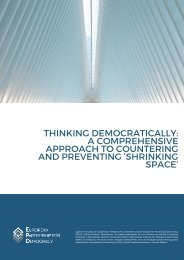Repression and resilience: Diagnosing closing space mid-pandemic
Create successful ePaper yourself
Turn your PDF publications into a flip-book with our unique Google optimized e-Paper software.
8 REPRESSION AND RESILIENCE: DIAGNOSING CLOSING SPACE MID-PANDEMIC<br />
A theoretical framework<br />
of democratic <strong>space</strong><br />
Democratic <strong>space</strong> as competition <strong>and</strong><br />
cooperation<br />
A global <strong>and</strong> systematic trend of restrictions on civil<br />
society has been observed since 2012. 3 At the same<br />
time, research shows a growing trend of challenges<br />
<strong>and</strong> threats to democracy, oftentimes described as<br />
‘democratic backsliding’ or ‘authoritarian resurgence’.<br />
These simultaneous challenges have led some policymakers<br />
<strong>and</strong> practitioners to consider both together as a<br />
<strong>closing</strong> of the broader democratic <strong>space</strong>. 4 Yet conceptual<br />
confusion remains an obstacle to effective action to<br />
counter attacks on democratic <strong>space</strong>. 5<br />
We define democratic <strong>space</strong> as a “produced social <strong>space</strong><br />
in which there is political contestation <strong>and</strong> inclusiveness<br />
reflected in the extent to which citizens have the<br />
opportunity to (a) formulate their preferences, (b)<br />
articulate their preferences <strong>and</strong> (c) have their preferences<br />
weighed equally in the conduct of government”. 6 It is the<br />
broader marketplace of ideas <strong>and</strong> the institutions that<br />
uphold a balance between competition <strong>and</strong> cooperation<br />
within the decision-making process over public affairs.<br />
This definition of democratic <strong>space</strong> was used to conduct<br />
in-depth analysis of the different tactics to close<br />
democratic <strong>space</strong> in 7 country case studies, conducted<br />
by the European Partnership for Democracy (EPD) <strong>and</strong><br />
the Netherl<strong>and</strong>s Institute for Multiparty Democracy<br />
(NIMD) from 2017 to 2019. 7 The research attempted to<br />
deepen the underst<strong>and</strong>ing of ‘democratic <strong>space</strong>’ in view<br />
of the conceptual confusion <strong>and</strong> tensions with the term<br />
‘civic <strong>space</strong>’, <strong>and</strong> the limited results from the international<br />
community’s efforts to counter <strong>closing</strong> ‘civic <strong>space</strong>’. This<br />
research led to us adopting the following conceptual<br />
framework based on 3 pillars:<br />
• Civic <strong>space</strong> is the <strong>space</strong> within which citizens inform<br />
themselves, debate public affairs with others, form<br />
opinions, express their views, organise themselves<br />
around shared interests, <strong>and</strong> organise for collective<br />
action. Civic <strong>space</strong> is guaranteed through human<br />
rights legislation <strong>and</strong> requires political will, security<br />
<strong>and</strong> peace, <strong>and</strong> a rights-respecting administration<br />
to uphold it.<br />
• A level political playing field is the pluralist public<br />
<strong>space</strong> where different political actors <strong>and</strong> organised<br />
political groups – particularly political parties –<br />
compete for public support, in view of winning future<br />
elections. A level political playing field requires<br />
electoral <strong>and</strong> political party legislation that is<br />
equally beneficial to the incumbent <strong>and</strong> opposition<br />
parties, so that the opposition or new political actors<br />
3 Following the example of the Russian ‘foreign agents’ law in 2012, a global <strong>and</strong> systematic trend of restrictions on civil society has been<br />
identified <strong>and</strong> labelled as ‘shrinking <strong>space</strong>’ by many actors in the field. For a chronological overview, see European Parliament (2017): Shrinking<br />
<strong>space</strong> for civil society: the EU response. Available here.<br />
4 Brechenmacher, S. & Carothers, T. (2019): Defending Civic Space: Is the International Community Stuck? Available here. See also: European<br />
Parliament (2017): Shrinking <strong>space</strong> for civil society: The EU response. Available here.<br />
5 Ibid.<br />
6 Netherl<strong>and</strong>s Institute for Multiparty Democracy (2017): Research methodology on <strong>closing</strong> democratic <strong>space</strong>.<br />
7 European Partnership for Democracy & Netherl<strong>and</strong>s Institute for Multiparty Democracy (2020): Thinking democratically: A comprehensive<br />
approach to countering <strong>and</strong> preventing ‘shrinking’ <strong>space</strong>. Available here. The research was based on the following country case studies: El<br />
Salvador, Georgia, Guatemala, Honduras, Indonesia, Kenya, <strong>and</strong> Zimbabwe.

















